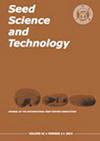SNP genotyping of maize (Zea mays) hybrids and parental inbred lines for genetic purity testing using double digest restriction site-associated DNA sequencing
IF 3
4区 农林科学
Q2 AGRONOMY
引用次数: 2
Abstract
Maize (Zea mays) is the third major cereal crop in the Indian subcontinent, but the crop yields per hectare of Indian maize cultivars are less than half of the global average due to the impurity of seed lots supplied to farmers. In this study, we discovered high-quality Single Nucleotide Polymorphic markers (SNPs) in two widely cultivated maize hybrids and their parental inbreds. Paired-end double digest restriction site-associated DNA sequencing was used to discover SNPs and a total of 30,764,454 reads with a read length of 151 bp per sample were generated. Genotyping of SNPs for maize hybrids ‘MAH 14-5’ and ‘Hema’ revealed a total of 47,812 and 15,815 Genetic Purity Analysis markers, respectively, of which 44,388 and 12,391 were unique with 3,424 being common to both hybrids. Identified SNPs were used to develop primers for Kompetitive Allele-Specific PCR genotyping assays to determine the genetic purity of 10 seed lots and the results were found to correlate with Grow-out-Tests. Thus, the SNPs discovered in this study proved reliable to test the genetic purity of commercial seed lots. Advances in plant molecular breeding tools especially ddRADseq for SNP discovery offer new opportunities to genotype existing cultivars and accelerate the production of genetically pure seeds.利用双酶切酶切位点相关DNA测序技术对玉米(Zea mays)杂交种和亲本自交系进行遗传纯度检测的SNP基因分型
玉米(Zea mays)是印度次大陆的第三大谷类作物,但是由于提供给农民的种子批次不纯,印度玉米品种每公顷的作物产量不到全球平均水平的一半。在本研究中,我们从两个广泛栽培的玉米杂交种及其亲本近交系中发现了高质量的单核苷酸多态性标记(SNPs)。使用配对端双酶切位点相关DNA测序发现snp,共生成30,764,454个reads,每个样本的read长度为151 bp。对玉米杂交‘MAH 14-5’和‘Hema’的snp进行基因分型,分别发现47,812个和15,815个遗传纯度分析标记,其中44,388个和12,391个是独特的,3424个是两种杂交共有的。利用鉴定到的snp开发引物进行竞争性等位基因特异性PCR基因分型分析,以确定10个种子批次的遗传纯度,并发现结果与生长试验相关。因此,本研究中发现的SNPs被证明是可靠的,可以测试商业种子批次的遗传纯度。植物分子育种工具的进步,尤其是用于SNP发现的ddRADseq技术,为现有品种的基因分型和加速基因纯种子的生产提供了新的机会。
本文章由计算机程序翻译,如有差异,请以英文原文为准。
求助全文
约1分钟内获得全文
求助全文
来源期刊

Seed Science and Technology
农林科学-农艺学
CiteScore
3.00
自引率
28.60%
发文量
36
审稿时长
>36 weeks
期刊介绍:
Seed Science and Technology (SST) is an international journal featuring original papers and articles on seed quality and physiology related to seed production, harvest, processing, sampling, storage, genetic conservation, habitat regeneration, distribution and testing. A journal that meets the needs of researchers, advisers and all those involved in the improvement and technical control of seed quality. Published every April, August and December.
 求助内容:
求助内容: 应助结果提醒方式:
应助结果提醒方式:


